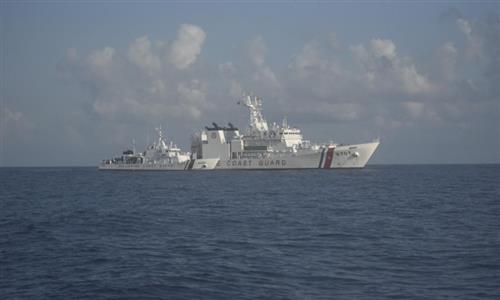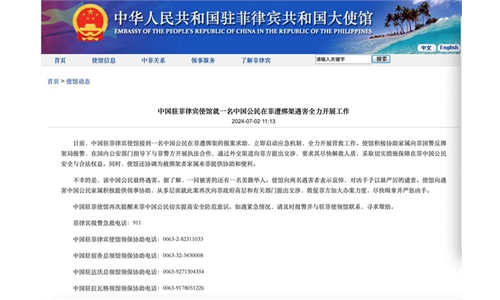Philippines' attempt to repeat old tricks at Xianbin Jiao is nothing but a pipe dream

Cartoon:Carlos Latuff
Recent on-site images obtained by the Global Times showed that the Philippines has attempted to deliver construction materials, suspected to be cement, to the illegally stationed Philippine Coast Guard (PCG) ships at Xianbin Jiao, or Xianbin Reef, in the South China Sea. Since April this year, the PCG ship BRP Teresa Magbanua has been in the waters of China's Xianbin Jiao.
On Tuesday, China responded to the Philippines' act of sending supplies to the illegally stationed ships at the Xianbin Jiao. Liu Dejun, spokesperson for the China Coast Guard (CCG), said in a statement that on Monday, the Philippines dispatched three coast guard vessels to transfer personnel and supplies to its illegally stationed ship at Xianbin Jiao. In response, the CCG monitored and controlled the situation. The retention of Philippine vessels at Xianbin Jiao has infringed upon China's territorial sovereignty and maritime rights, violated the Declaration on the Conduct of Parties in the South China Sea, and undermined peace and stability in the region, Liu said.
Since last year, the Philippines has repeatedly transported construction materials to the military vessel illegally grounded at Ren'ai Jiao (Ren'ai Reef) and even weapons and ammunition, attempting to carry out large-scale repairs and reinforcements in order to achieve permanent occupation of Ren'ai Jiao. Now, the Philippines wants to repeat the same trick at Xianbin Jiao. However, this idea is absurd.
Ding Duo, deputy director of the Institute of Maritime Law and Policy at the National Institute for South China Sea Studies, told the Global Times that the Philippines attempted to transport supplies to the illegally stationed coast guard ship at Xianbin Jiao, which is clearly a long-term, premeditated action.
Yang Xiao, deputy director of the Institute of Maritime Strategy Studies under the China Institute of Contemporary International Relations, said the Philippines fails to realize that this opportunistic idea has no feasibility at all. "Even though they illegally grounded a warship at Ren'ai Jiao, we thwarted their attempts to build permanent facilities. Now, at Xianbin Jiao, the Philippines is even less likely to succeed," Yang said.
On the other hand, the Philippines dares to provoke repeatedly at Ren'ai Jiao, Xianbin Jiao, and Huangyan Dao (Huangyan Island), and the cause lies in the US' behind-the-scenes support.
Since Ferdinand Marcos Jr came to power, the Philippines has been wanting to strengthen its military relationship with the US. The Philippines frequently provokes China in the South China Sea, distorting the truth and criticizing China's reasonable and legal law enforcement actions, with the aim of hoping for US intervention and forcing Washington to lower the threshold of using US-Philippines Mutual Defense Treaty. Although Washington has stated that the US is obligated to defend the Philippines, it is actually more of a hype and a threat to boost the Philippines' morale.
The disputes between China and the Philippines over territorial sovereignty and maritime jurisdiction in the South China Sea are bilateral issues between the two countries and have nothing to do with the US. For the Philippines, willingly becoming a lackey of a foreign power and actively involving itself in conflicts with neighboring countries is unwise.
The fundamental purpose of US foreign policy is to maintain hegemony in the Asia-Pacific region and globally. It merely sees the Philippines as a tool and pawn in its policy of containing China.
Despite US' backing, the Philippines did not gain any advantage in its provocations against China in the South China Sea. Philippine Foreign Minister Enrique Manalo said last week that China and the Philippines may hold talks on the South China Sea issue, and Manila hopes the talks could take place in July. Yet, it continues to provoke in the South China Sea, proving that the Philippines sees negotiations as a stopgap and has not fundamentally understood the root cause of the problem.
China has always called on the Philippines to return to the path of resolving disputes through dialogue and consultation. It should be clear that in the escalating situation in the South China Sea, the one provoking and escalating the situation is the Philippines. The door for dialogue and communication between China and the Philippines is open, but the key is that true sincerity for a dialogue needs to be shown, instead of just talking about dialogue while continuing to provoke and cause trouble.
China has an unwavering determination and sufficient means to defend its territorial sovereignty, and if the Philippines insists on staging a game of self-inflicted humiliation in the South China Sea, it is overestimating itself. The Philippines will gain nothing from provocation.



